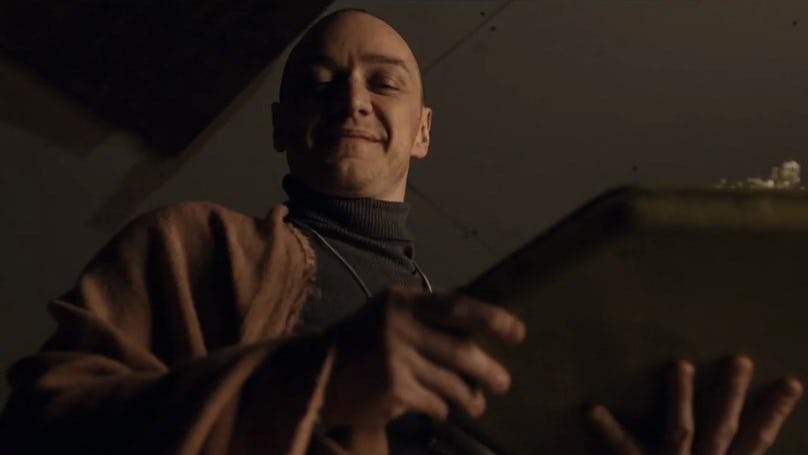M. Knight Shyamalan’s latest film “Split” combines his love
of Hitchcockian thrills and with his predilection for high-concept myth-making
and fuses these obsessions in a way that’s surprisingly energetic and captivating. I have to say surprising
because since the heights of his career in early 2000 Shyamalan has only recently come off a long losing-streak s. After big budget genre-flops such as “Lady in the
Water” and “The Last Airbender” he lost of lot of credibility as a coherent
storyteller with both audiences and critics alike. Halving his costs under the
pop-horror banner of Blumhouse Productions, it seems that he’s now able to make
smaller, more efficient work without the pretenses of prestige.
James McAvoy is given the spotlight playing a troubled man named
Kevin who constantly switches between multiple personalities. After a
complicated battle of dominance between the personalities inside of his mind,
he kidnaps three teenage girls in the hopes to appease a brooding darkness growing
from within. Anya Taylor-Joy plays Casey Cook, the most introverted and
ostracized of these women, and through this kidnapping experience she's forced to
relive her past abuse. Haley Lu Richardson and Jessica Sula portray the other
two girls who can’t understand why Casey has no will to fight. As they try to
come up with clever ways to escape McAvoy’s underground lair, Casey tries to
get to know and manipulate Kevin’s separate personalities.
We get to know McAvoy as a brutish
clean-freak and fetishist named Dennis, a passive-aggressive English woman
named Patricia, a nine-year-old attention-seeker named Hedwig, a nervous
fashionista named Barry and a demonic force of nature known only as The Beast.
While Dennis and Patricia--the personalities responsible for the kidnapping--have the most control over their host, the others have sought the help of a
psychiatrist named Dr. Karen Fletcher (Betty Buckley), who's beginning to notice that her patient has something to hide.
Like any Shyamalan film, there’s a lot of plot here and his
characters are subservient to the whims of the director’s set-ups and reveals. His
depiction of mental illness has less to do with diagnose-able science and more
with pulp mythology that’s rooted in past psychodramas and paranormal
science-fiction. If you’re willing to
suspend your disbelief and give in to the script’s wacky concepts, as a
thriller, the movie works well enough. The ticking-clock set up at the
beginning of the film allows for constant tension that keeps everything on a
track, even as scenes digresses into long-winded explanations of the movie
rules through clunky, expository dialogue.
McAvoy’s having a lot of fun with these multiple roles and approaches
the film’s goofy plot with just the right amount on whit and sarcasm to aid in
its occasional black comedy. Anya Taylor-Joy is more informed by her
character’s flashbacks than by her performance, but her emotional stillness
helps to ground the movie’s themes and dramatic stakes.
“Split” is a mixed bag; it’s overwritten, it’s a bit hokey
and Shyamalan has some problematic and concerning ideas about abuse-survival as
a means of martyrdom, but the film is never boring and it managed to keep me
engaged with the story as it moved along. Thrill rides
don’t necessarily have to be realistic, and though I wish this ride hadn’t stopped
every ten minute to explain something that didn’t need explaining, despite it's failings, I appreciated the end-result.
Grade: B-
Originally Published in the Idaho State Journal/Feb-2017
Grade: B-
Originally Published in the Idaho State Journal/Feb-2017
Listen to this week's episode of Jabber and the Drone to hear more conversation about "Split."

No comments:
Post a Comment